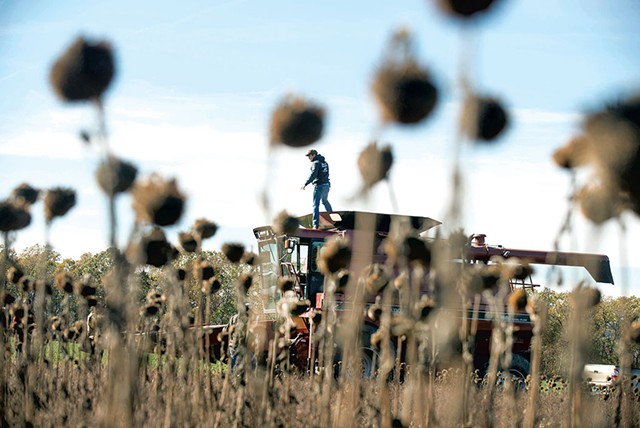
- Caleb Kenna
- Jack Kennett
Netaka White eyes a field of sun-withered sunflowers rustling in a stiff autumn wind. Even before a harvester mows down the seven-acre crop in Addison, he knows that the yield, which is destined for producing sunflower oil, will be underwhelming. The seeds were planted later than expected owing to a very wet spring, which was followed by an unusually arid summer.
Still, White tries to put a positive spin on the desiccated crop. "We won't have to dry it," he says optimistically. "Just think of all the energy we won't have to use."
As a 22-foot-wide combine chews through the brittle stalks — its spiked, metal maw resembling a vehicle out of a Mad Max movie — sunflower chaff flies from the rear of the harvester.
By day's end, several tons of sunflower seeds are bagged and ready to be trucked to Full Sun Company in Middlebury, which opened last year as New England's first non-GMO-verified oil mill. There, the seeds will be cold-pressed into artisanal sunflower oil.
White, 54, and his business partner, David McManus, 55, founded Full Sun Company in 2014 with the goal of creating high-quality unrefined food oils from non-GMO seeds grown by local farmers. In its first year of production, Full Sun pressed only about 700 gallons combined of sunflower and canola oil. But by the end of next year's harvest, White predicts that the company will be producing about 36,000 gallons of oil annually; and, by 2020, 140,000 gallons.
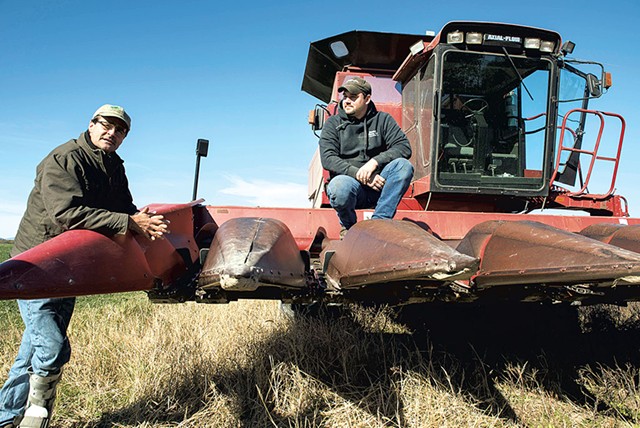
- Caleb Kenna
- Netaka White and Jack Kennett
Full Sun's 6,000-square-foot processing facility is located on Middlebury's food- and beverage-intensive Exchange Street, in warehouse space vacated by Vermont Soap after its June 2014 fire. On one side of the warehouse, about 30 one-ton bags of canola and sunflower seeds await processing. On the other side, an automated auger feeds the seeds into a cold-press expeller, whose slow churn results in a dribble of nutty, golden-brown oil. It's ideal for low-heat sautéing and drizzles, as well as for making sauces, dressings and marinades.
McManus, who's based in Etna, N.H., has years of experience in the processed-food industry, having helped launch the organic-meat company Applegate. He and White chose the cold-press process because it yields oils that are healthier and more flavorful than the heavily refined and mass-produced "French fry" oils, he explains. Full Sun's sunflower oil is low in saturated fat and rich in oleic monounsaturated fatty acids and omega 3, 6 and 9; it's also a great source of vitamin E. The company's canola oil is likewise low in saturated fat and contains omega-3 and -6 fatty acids. Both are certified non-GMO products.
The sunflower and canola oils are stable up to about 360 degrees Fahrenheit, McManus adds. Though that smoke point means that neither oil is suitable for deep frying or searing, both provide cooks with a fair bit of versatility and flavor when used as a drizzle, a finishing oil, or a base for dressings and sauces — something McManus often has to explain at in-store demonstrations.
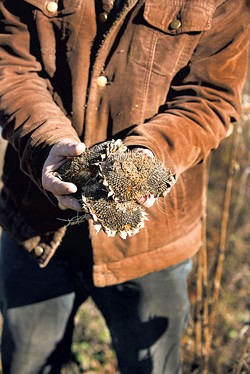
- Caleb Kenna
"It's really an education, because most [chefs] have never tasted anything like it," McManus says. "It's very, very different."
Full Sun's products are just starting to get discovered by Vermont restaurateurs and grocery buyers, who say they're impressed with its product and mission.
"We're delighted to connect with Full Sun Company and share their non-GMO canola oil and sunflower oil with our customers," notes Allison Weinhagen, director of community engagement at City Market/Onion River Co-op in Burlington. "These high-quality Vermont and regionally sourced oils are milled in Vermont and fill a long-standing gap that we've had in our oil set in terms of local products."
Because Full Sun's cold pressing uses no heat or chemicals, the process is exceptionally clean and creates virtually no waste, White says. In fact, the organic material left behind after the pressing isn't referred to as a byproduct but as a "coproduct" — a high-protein, high-fat meal that the company bags and sells to area farmers as feed for chickens and hogs. Any off-spec oil gets sold to local biofuel producers.
McManus and White didn't initially set out to make oil for food, but for fuel. Back in 1990, in Oregon, White founded a company called Artisan Gear, which made backpacks and other hiking accessories out of hemp canvas. By 2001, when the domestic hemp industry "imploded," White says, he shifted his focus from hemp as a fiber source to hemp as seed oil. He began helping farmers "green up" their operations by weaning them off diesel fuel and replacing it with biofuels.
For the next decade, White thrived in the biofuel industry, first as cofounder and executive director of the Vermont Biofuels Association, then as cofounder of Acorn Renewable Energy Co-op, and finally as bioenergy program director of the Vermont Sustainable Jobs Fund.
"I just fell in love with the whole notion of growing a crop here and turning it into oil," he says. "Oil has 101 uses. There's so much you can do with it."
White and McManus met while the latter was working in Brattleboro on an alternative energy project. Although White initially thought the two would team up to found a biofuel company using Vermont and other regionally grown seed crops, they quickly realized that such a model wasn't economically viable, because local growers simply couldn't produce the volume of oilseed needed to support a biofuel-production plant. So McManus suggested that they grow seed crops for culinary oil instead.
One novel component of Full Sun's business model is that it contracts with farmers to grow the seeds, then provides them with a seed stock best suited for growing in Vermont's climate and soil to produce food oil. Such an arrangement is advantageous to growers, McManus explains, because the prices they receive for these crops aren't as volatile as those of other commodities, such as corn and soybeans, which are heavily traded on the Chicago Board of Trade.
Currently, only 2 to 3 percent of Full Sun's sunflower and canola seeds are grown in Vermont or within a 100-mile radius; much of its non-GMO canola comes from Prince Edward Island and other farms in eastern Canada. However, White and McManus hope that will soon change. White says they're actively recruiting local growers and expect to source about 50 percent of their canola and sunflower seed from local growers by 2020.
Currently, Full Sun sells most of its oil to retail outlets. That, too, will likely shift, as more chefs, food-service directors and commercial producers of bottled dressings, sauces and marinades discover the product, White says. Recently, for example, Full Sun was approached by a Vermont chip maker, as well as by a truffle-oil producer in the Boston area, both seeking to use its products as bases.
"Two weeks ago, I wouldn't have been able to tell you what a truffle oil is," White admits. "Now I can tell you they'll be buying our canola oil."
Richard Jarmusz, executive chef at the University of Vermont Medical Center, recently began using Full Sun's sunflower oil in the hospital's Garden Atrium café, which serves about 250 meals per day of locally grown or produced foods. (Eventually, he plans to use the oil in the other hospital cafés and for all patient meals.) Jarmusz says he uses Full Sun's sunflower oil for sautéing and preparing salad dressings — not just for its obvious health benefits, but also for its taste.
"What I like is the nuttiness of the oil," Jarmusz explains. "It adds another dimension to the flavors of the dishes we're preparing."
Even as Full Sun expands the reach of its original products, it has a new one in its oil pipeline. Returning to his roots in the hemp-products industry, White says they expect to begin growing, harvesting and pressing hemp seeds for culinary oil by 2017.
"We're hemp-ready right now," White says, "but it's too hard to get the seed in a commercial volume." To get there, he continues, he and McManus have been trying to grow enough hemp to plant a 100-acre field.
Will a 100-acre hemp field, which bears a striking resemblance to a field of marijuana, raise any nosy neighbors' eyebrows? White isn't concerned; Full Sun's growing operation is already registered with the Vermont Agency of Agriculture, Food & Markets. As he puts it, "I was more concerned that kids would see it and start cutting it down, thinking it's going to get them high, which it can't possibly do."
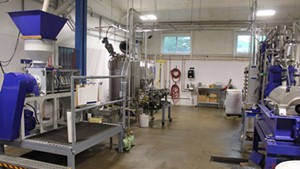
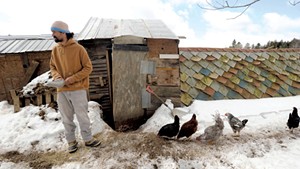
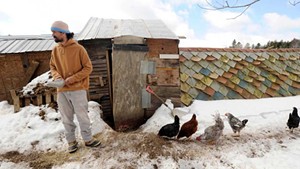









Comments
Comments are closed.
From 2014-2020, Seven Days allowed readers to comment on all stories posted on our website. While we've appreciated the suggestions and insights, right now Seven Days is prioritizing our core mission — producing high-quality, responsible local journalism — over moderating online debates between readers.
To criticize, correct or praise our reporting, please send us a letter to the editor or send us a tip. We’ll check it out and report the results.
Online comments may return when we have better tech tools for managing them. Thanks for reading.